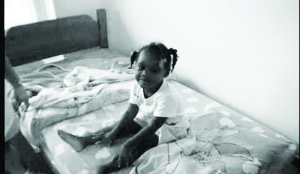By NORMA SIAME –
WHEN I joined the Times of Zambia as a cab reporter, I had little vision beyond counting the days to my next pay cheque. Over the years,
I have achieved many milestones in both my professional and personal life. Of all the milestones, one stands out … That is my becoming a
parent.
This, I believe gave me a new perspective of life. I stopped being carefree agent with little worries as I realised I had become
responsible for the well-being of another human being other than myself.
So as I introduce you to my parenting column, I hope to bring out various issues about rigours and joys of parenting. And to for the
maiden article, I chose a topic that affects many parents have to deal with and that is bed-wetting.
And that topic is bed-wetting.
Firstly, I would like to point out that bed-wetting is not only a childhood condition but one that affects hundreds of adults as well.
Many can relate with the horror falling asleep and having pleasant dreams about a day well spent laughing and playing with your friends before the rude awakening.
In the dream, you laughingly excuse yourself to go and take a leak and just as you start relieving your bladder of the built-up pressure, you
discover you were actually not playing or laughing with friends but sleeping. or children, the actual bed wetting is, however, not as traumatic as the horror of doing the walk of shame from the house to the clothes line to hang out wet bedding to dry.
For very young children, the condition is easier to brush off as parents usually take a laid back attitude that a child will soon outgrow the bed-wetting stage.
For those that enter their teenage years without kicking the habit, bed-wetting becomes a bigger problem as it turns into a source for cruel jokes at times from family members and peers.
In the quest of finding solutions to bed-wetting, some parents have gone to extremes testing various unorthodox cures.
One parent who was at her wits left her home on the Copperbelt and travelled to Luapula Province because a traditional doctor had told her that water from Lake Bangweulu that had collected in a fisherman’s hollowed banana boat would cure her daughter of bed-wetting. The mother was by this time ready to try anything because her daughter, who as at the time in secondary school, had missed the chance to attend a good boarding school because of bed-wetting.
The anxious mother travelled home with her ‘bottled’ boat water safely tucked in her handbag.
However, the daughter who drank a healthy dose of the banana boat water wet her bed for a fortnight non-stop. Other parents have been known to go to the extremes of putting bed-wetting children on a nest of fire ants so that fear of being bitten could prevent them from bed-wetting.
While crawling the web, I came across a Facebook group were bed-wetting was discussed at length and a contributor on the forum swore that calcium tablets had helped her stop wetting her bed when all else including being woken up at intervals to urinate at night had failed.
According to a study published in Journal of Urology, this was apparently true.
The journals said about 50 per cent of children lack sufficient levels of the hormone ADH. In most people, the body produces ADH during the night to suppress kidney activity.
In children who lack enough ADH, the kidneys continue producing urine at the normal rate.
These children sleep heavily enough that they do not feel the sensation that forces us to go to a room on convenience and urinate.
In adults, bed wetting at night is called nocturnal enuresis. Some people produce too much urine at night or may have an overactive or unstable bladder, also causing daytime symptoms of frequency, urgency and leakage. Stress and anxiety can be factors, while occasionally there may be a urinary tract infection.
Treatments include medications, bladder training and enuresis alarms.
Some people wet the bed all their lives. O
thers become dry during childhood, but later start wetting the bed again. Bedwetting affects different people in different ways.
The practical problems of coping with wet bedding, even at home can be considerable.
Lifestyle concerns also come into play as you may find that you worry about staying away from home for the night, going on holiday or business trips, going to college or moving away from home. You may find you don’t want to get into a relationship in case your new partner finds out. It may cost also a lot of money to wash and dry bedding or buy disposable products.
An article by Cindy Horton on Children’s Supplements for Bed-Wetting makes these recommendations coupled with a doctor’s opinion to guide your choice of supplements to help control your child’s or your own bed-wetting.
-Take “free-form amino acid complex” according to the label directions.
This supplement will strengthen the bladder muscle.
-A daily supplement of 750 mg calcium and 175 mg magnesium helps control the bladder spasms that may trigger bed- wetting episodes.
-No more than 5,000 IU (international units) of vitamin A daily regulates bladder-muscle functions.
-Vitamin E (300 IU) and cod liver oil taken according to label directions can help normal bladder function as well.
Zinc–less than 10 mg daily–will encourage proper bladder function and boost the immune system. This lessens the chance of urinary tract
or bladder infections.
As one continues to try and overcome the habit, good personal hygiene is important. As it will probably take some time to completely overcome bedwetting, practical management of the condition is important. Fresh urine should not smell, and as long as you have a good wash each day and keep wet sheets in an airtight container until washed, odour should not cause a problem.
For contributions email me at norma.siame@gmail.com







